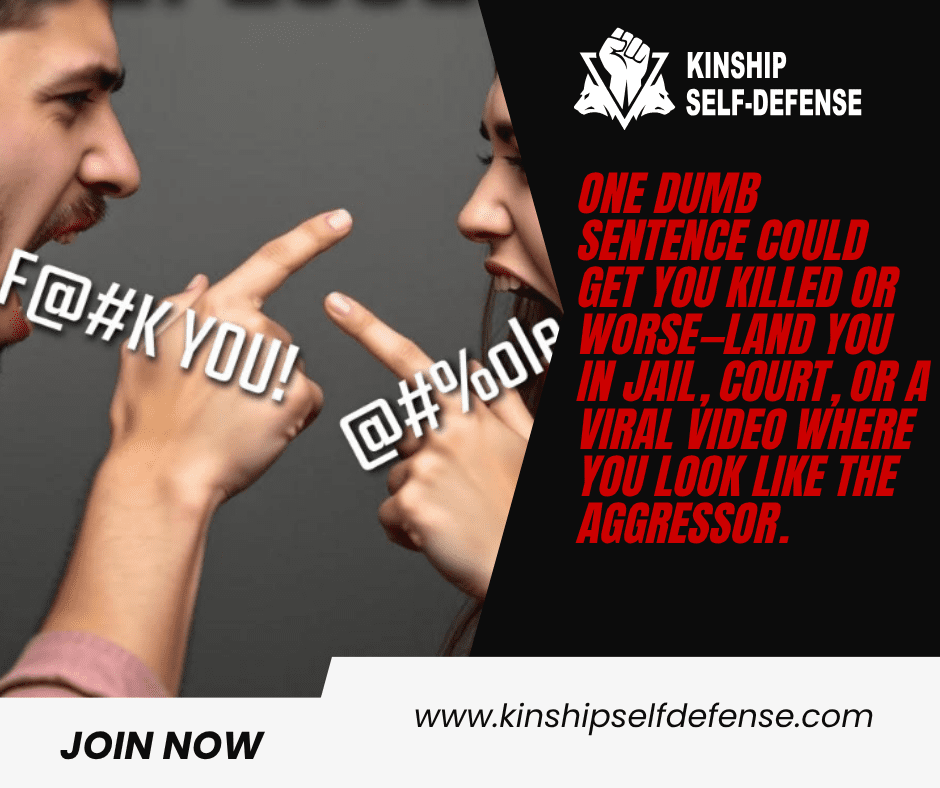Most fights don’t start with violence.
They start with words—sarcastic comments, angry demands, or careless phrases that escalate tension instead of calming it. In today’s world, one sentence said in the wrong tone can cost you more than just your pride. It can land you in court, jail, or a viral video that ruins your reputation.
If you’re serious about self-defense, it’s not enough to train your body. You have to train your mouth—and your mind.
Here are five essential rules for verbal de-escalation, drawn from street-smart sources including police trainers, mental health professionals, and close-combat instructors.
1. Always Be Nice First
Starting with calm, respectful communication does two things:
- It reduces the other person’s stress level, making them less likely to lash out
- It lowers your profile as a threat, giving you more control over the encounter
This isn’t about being passive. It’s about maintaining control and reading the situation with discipline.
According to Shooting Illustrated, a publication focused on practical self-defense training, staying calm and kind—even when someone is acting aggressive—can give you a strategic advantage. In their article “The Power of Preparedness,” they explain how appearing peaceful creates an element of surprise if you’re ever forced to act physically.
Example:
Instead of rolling your eyes or showing attitude, say something simple like:
“Hey, are you alright?”
This opens space for the other person to back down without losing face.
Source: The Power of Preparedness – Shooting Illustrated
2. Don’t Threaten or Challenge
Many people think saying “Back off or else!” makes them look strong. In reality, it puts you at risk.
Verbal threats act as psychological triggers—they escalate fear, pride, and aggression. In conflict psychology, this is known as “threat response activation.” When someone feels publicly challenged, especially in front of others, they often react impulsively to save face.
Furthermore, issuing threats removes your tactical edge. If you tell someone to expect violence, they’ll brace for it. You’ve lost the element of surprise.
Better approach:
“I don’t want trouble. Can we just talk?”
This diffuses the tension without making you seem weak or submissive.
Sources:
- Real-life conflict videos via YouTube de-escalation search
- NRA shooting illustrated (Using the element of surprise as a personal self defense tool)
3. Don’t Give Orders
Telling someone “Calm down!” is one of the worst things you can say in a heated moment.
According to a report, commands like this backfire because they imply control and superiority. The person hears: You’re out of control, and I’m above you. That increases tension rather than reduces it.
Instead, use collaborative or polite language:
“Can we step back for a second?”
This shows you’re trying to solve the problem, not dominate the other person.
Supporting source: Lexipol, a platform that trains law enforcement agencies on communication and use-of-force alternatives.
4. Avoid Accusations: Never Say “You’re Lying”
Even if someone is obviously twisting the truth, saying “You’re lying” turns the encounter into a personal attack. According to The Conflict Expert, a negotiation and mediation training platform, direct accusations attack a person’s ego and identity—two things people defend aggressively.
The goal isn’t to prove you’re right. It’s to resolve the situation or exit it safely.
Alternative phrasing:
“Maybe I misunderstood. Here’s what I thought…”
This gives the person a way out of the confrontation without escalating shame or defensiveness.
Source: The Conflict Expert – Conflict Resolution Tools
5. Make It About Them, Not You
Most people calm down when they feel seen, heard, and respected. That’s why experienced counselors, teachers, and crisis negotiators focus on empathy-driven communication.
Asking simple questions like:
“How can I help?”
or
“What do you need right now?”
shifts attention away from the argument and toward solutions.
This is backed by psychological research. According to Verywell Mind, active listening and validation reduce emotional reactivity and promote problem-solving. Similarly, WholeHearted School Counseling emphasizes the power of “I-statements” in defusing conflict.
Use lines like:
“I see you’re upset. I want to understand.”
Sources:
Bottom Line
De-escalation is a superpower.
It’s not a soft skill—it’s a survival skill.
If you can master your words, your tone, and your presence, you’re less likely to get hurt, arrested, or caught in something bigger than you expected. Violence is messy. Court is expensive. Jail is traumatic. And public videos don’t show context—they just show what the camera catches.
Verbal self-defense isn’t about walking away—it’s about walking away with your power, your safety, and your future intact.
Related Topics You May Like:
- Awareness and Confidence Keep You Safe
- Self-Defense Laws in South Africa: When Defending Yourself Can Lead to Legal Trouble
- Why South Africa’s Self Defense Laws Seem to Protect Criminals
